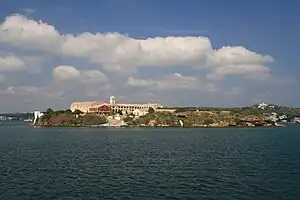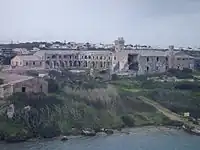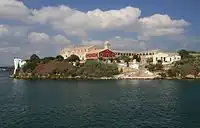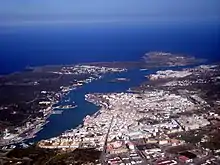Illa del Rei
L'Illa del Rei (English King's Island; Spanish Isla del Rey), also called Hospital Island in English, is a small island in the middle of the main navigable entry channel to Mahon on the northeastern side of Menorca in the Mediterranean Sea.
 | |
 Illa del Rei Location in Spain | |
| Geography | |
|---|---|
| Coordinates | 39°53′12″N 4°17′15″E |
| Archipelago | Baleric Islands |
| Area | 0.0424 km2 (0.0164 sq mi) |
| Length | 0.289 km (0.1796 mi) |
| Width | 0.283 km (0.1758 mi) |
| Administration | |
Description
.png.webp)
The island is roughly pear-shaped, 289 metres (948 ft) long and 283 metres (928 ft) wide with a total area of 4.24 hectares (10.5 acres). It is rocky with fairly steep sides around much of the perimeter and 14.5 metres (48 ft) above sea level at its highest point. Today the island is uninhabited and primarily a tourist attraction. It is dominated by the former hospital lying on the southwestern side and clearly visible from the shore on either side of the harbor.
History
The island's name comes from the legend that King Alfonso III of Aragon first came ashore on the island during the Christian reconquest of Menorca in 1287. The island's earlier name, Illa dels Conills (Rabbit Island), was changed to Illa del Rei in honor of the conqueror.
The island also contains the remains of an early Christian basilica from the 6th century.[1] The remains were first discovered in 1888, when a mosaic was found which bore similarities to those of the synagogue at Hammam-Lif in North Africa, which had been discovered a few years before. Systematic excavations did not begin until 1964, when they uncovered the full footprint of the basilica and additional buildings, perhaps monastic, as well as additional mosaics.[1] The mosaics were moved to the Museum of Menorca for preservation and display.[2]
A hospital was first constructed on the island by the British in 1711 who controlled Menorca for most of the 18th Century. The island was called by the British Bloody Island or Hospital Island after the hospital. The island continued to be used as a hospital, as well as occasionally as a warehouse for coal and naval stores by the Spanish, French, British, Italian, and American navies through the 19th and 20th centuries. In 1964, a new hospital was built in Mahon and the island hospital was abandoned due to the difficulty of transporting patients.[3]
In 1979 the hospital and adjoining buildings as well as the basilica were placed under monument protection (Declaración de Monumento Histórico-Artístico y Arqueológico de carácter Nacional).
In 1993 the Illa del Rei was declared a biosphere reserve because, among other things, the island is the only habitat of Podarcis lilfordi balearica, an endemic subspecies of the Lilford's wall lizard (Podarcis lilfordi) from the family of the real lizards (Lacertidae).[4]
In 2004, the Fundación Hospital de la Isla del Rey was established with the aim of restoring and maintaining the facilities. The foundation succeeded in restoring the exterior of the main building in 2011, the 300th anniversary of the hospital, and continues to the improve facilities and provide access to the island to tourism.[3] Hauser & Wirth leased part of the islet from the foundation to create a 16,000 square foot art center, with gardens designed by Piet Oudolf.[5]
Gallery
 Hospital in 2008, in ruins
Hospital in 2008, in ruins Hospital in 2011, following restoration
Hospital in 2011, following restoration Ruins of the early Christian basilica
Ruins of the early Christian basilica Mahon from the air with the Illa del Rei in the middle, above the city center.
Mahon from the air with the Illa del Rei in the middle, above the city center. The endemic subspecies of Liford's wall lizard on the island.
The endemic subspecies of Liford's wall lizard on the island.
References
- "Early Christian Complex of Illa del Rei". Retrieved 2021-01-11.
- "MOSAIC OF THE LA BASILICA OF THE ILLA DEL REI". Museu de Menorca. 2021-01-11. Retrieved 2021-01-11.
- "Intorudcation - Illa del Rey". Fundación Hospital de la Isla del Rey. Retrieved 2021-01-11.
- "Podarcis lilfordi balearicus". Lacerta.de.
- Minder, Raphael; Reyburn, Scott (26 July 2021). "Art Meets Luxury Lifestyle at a Gallery's Sunny New Location". New York Times. Vol. 170, no. 59131. p. C6. ISSN 0362-4331. Retrieved 26 July 2021.